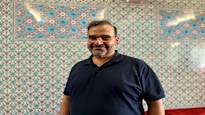HAMBURG Double-decker red and yellow Hop on, hop off tourist buses brake in turn on the fine lakeside boulevard in Hamburg.
Tourists’ heads turn towards the tall minarets, pale blue domed ceiling and fountains. Imam Ali Mosque is popularly known as the Blue Mosque. It is one of the oldest and most famous Muslim places of prayer in Germany.
“Oriental beauty in the middle of Hamburg”, says the recorded guide to the tourists’ ear buds. It has been added to since last week: but now it is closed.
Espionage and extremism
For years, Germany’s Constitutional Protection Agency monitored the Islamic Center of Hamburg, which owned the Blue Mosque. Since the 1960s, the main financier of the center and the mosque has been Iran.
The leaders of the Blue Mosque insisted that their connection with Iran is only religious, not political.
Last week, hundreds of police and other authorities raided the mosque and its branches in various parts of Germany.
Now the mosque has been seized by the state and the doors remain ajar. According to the Ministry of the Interior, the mosque is unconstitutional because it has spread ideas against free democracy, supported terrorism and probably spied for Iran.
Next, the German courts will decide whether the evidence was sufficient to close the center. Many politicians have been demanding closure for a long time.
“Direct connection to Iran”
The Blue Mosque is the main center of Iranian propaganda in Europe, an opposition activist Hanif Mahoutchiyan says. His parents fled from Iran to Germany even before he was born.
– Over the decades, the Iranian regime has managed to use its networks to gain a lot of power in Germany and spread propaganda. They skilfully use the basic freedoms in the German constitution, such as freedom of religion, says Mahoutchiyan.
– The mosque’s connection to Iran is direct. [Iranin ylimmän johtajan] Khamenei’s the close circle, among other things, chooses the leading imam of the mosque.
The deputy director, on the other hand, was allowed to leave a couple of years ago because he was suspected of supporting terrorist organizations and terrorist financiers.
“Many just want to pray”
According to Mahoutchiyan, Iran wants to tie refugees from different parts of the Middle East to radical doctrines through religious sentiments.
– Iranian mullahs establish and finance religious institutions, organizations and groups in order to grow in Europe, create a sense of belonging for them and gain their trust, Mahoutchiyan explains.
According to him, not all refugees who moved to Germany know that the Iranian regime is behind the mosque. They just want to continue practicing their religion after fleeing their homeland.
– But the Iranian administration has a monopoly position, especially in the Shia community. Here they quickly fall into the clutches of the mullahs and Iran’s Shiite Islam, Mahoutchiyan claims.
According to him, the activities of the Blue Mosque were a threat to Iranian people living in exile. It also traumatized them because they were not sure of their safety.
– A growing problem for the victims of the Iranian regime in recent years has been the fact that the people who have tortured us already in Iran, who tortured and executed several members of my family, are coming to leadership positions in Germany as well, and we have to face them again. This has been a very traumatizing experience for us.
Germany has seen demonstrations by radical Islamists in recent months. Israel’s military actions in Gaza have increased tensions.
In the April and May gatherings, radical Muslims demanded, among other things, the observance of Sharia law among German Muslims.
Dozens of mosques in Hamburg
There are about 70 mosques in Hamburg. Some of them are very small, only used by a few believers.
In the three-story central mosque of Hamburg’s Islamic community, or Schura, men and women pray on different floors. Shoes are left outside. The floor is covered by a thick red carpet.
The restaurant is busy at lunchtime.
Extremists are a small minority among Hamburg’s Muslims, the leader of the Schura Fatih Yildiz convince.
– Extremism is a phenomenon of society as a whole. Education, including political education, is very important to prevent it, and to maintain trust in society, Yildiz says.
In his opinion, the demands for a caliphate are related to a political ideology whose supporters believe that coming together under a single caliphate will solve the global problems and crises of Muslims.
– But when and where and in what form, it is not defined.
Yildiz thinks it is important that the UN and other international institutions pay attention to radicalization. In practice, only they can prevent the radicalization of large groups of people, in addition to education.
“We need a new place”
According to Yildiz, many Muslims in Hamburg now fear that the German authorities will also close down other Muslim communities. In his opinion, the authorities should assign Shia Muslims a new place of prayer as soon as possible.
Hanif Mahoutchiyan agrees. People must not be left with the idea that the closing of the mosque was due to religion.
– The authorities should make it clear that it is about politics, not the faith of Islam, says Mahoutchiyan.
Those left “homeless” by the Blue Mosque can become radicalized underground.
– People who just want to practice their religion must be offered the opportunity to do so. One must be able to credibly avoid the impression of Islamophobia, Mahoutchiyan hopes.
